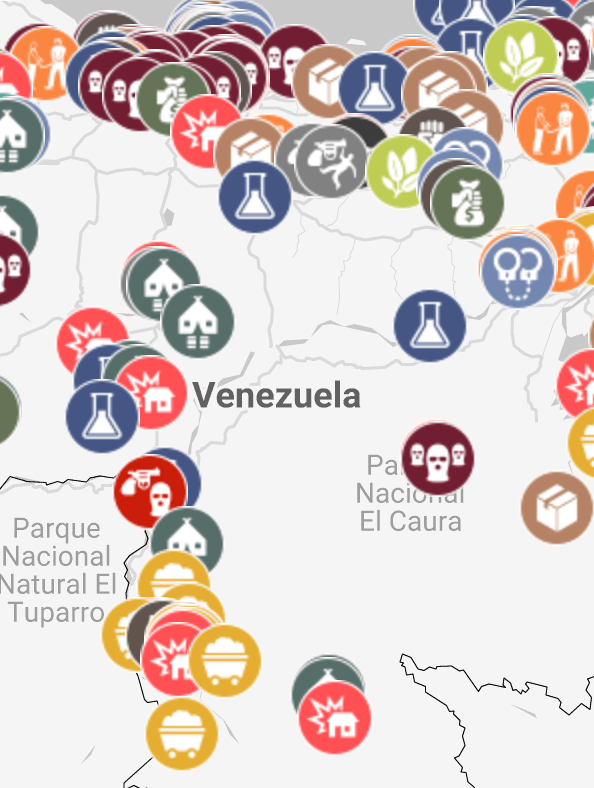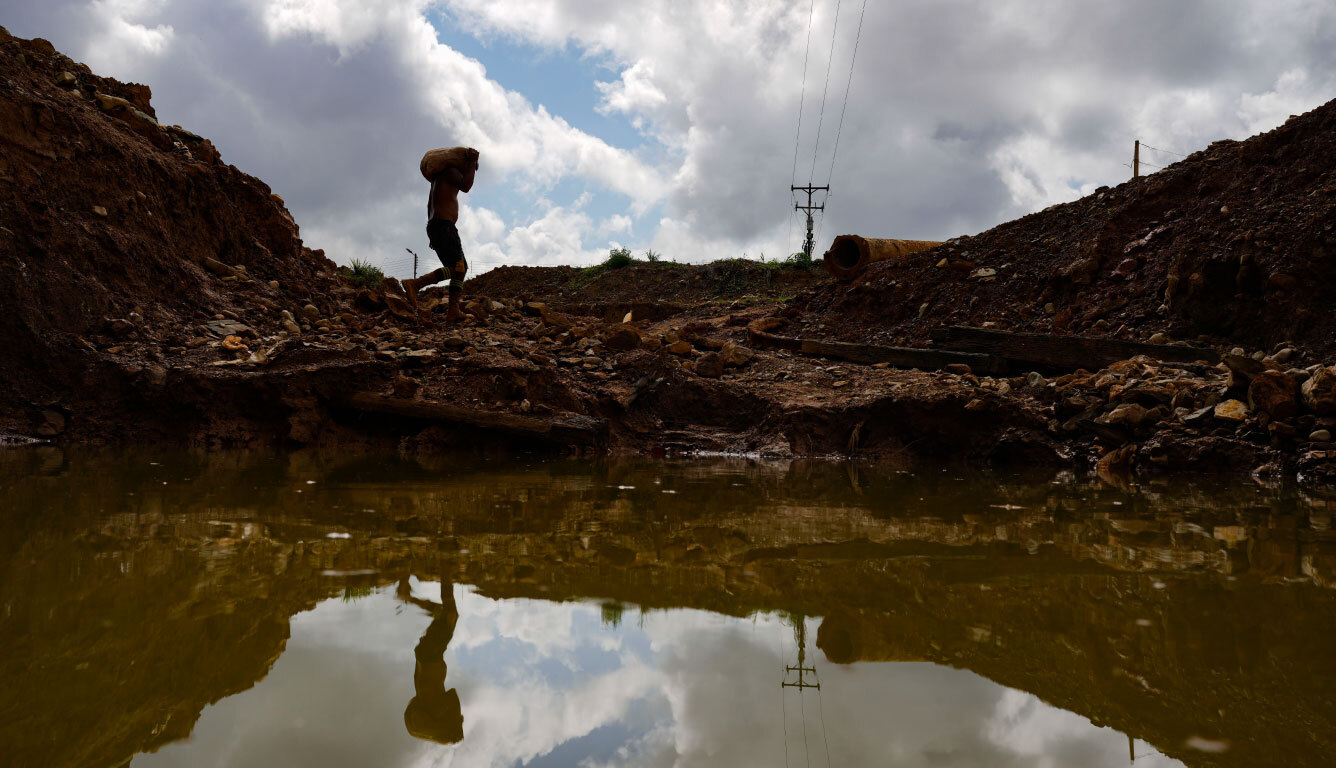Venezuela has the fastest-growing deforestation rate of any of the Amazon basin countries, and as in many of its neighbors, one of the main drivers is illegal mining. But combating that mining is complicated by the fact that the miners and the armed groups that control the trade are often business partners of corrupt elements of the Venezuelan state.

This analysis is part of a three-part series produced by InSight Crime’s Venezuela Organized Crime Observatory, looking at policy intervention opportunities in areas where organized crime intersects with the ongoing political and social crises in Venezuela. Read the first chapter on organized crime and migration here. Read the third chapter on organized crime’s involvement in Venezuela’s electoral process here.
Deforestation in Venezuela has been accelerating dramatically, with an estimated 140,000 hectares of primary forest in Venezuela destroyed between 2016 and 2020, according to the Monitoring of the Andean Amazon Project (MAAP).

This mining has not only fueled deforestation, but has left a trail of environmental destruction, including dangerously high mercury contamination levels, the degradation of soil and riverbeds, and the destruction of habitats in some of the world’s most biodiverse regions.
The impact has not only been felt by the environment. Throughout Venezuela’s mining hotspots in the states of Amazonas and Bolívar, mines are controlled, regulated, and, in some cases, directly run by armed groups, including guerrilla groups and mining gangs known as sindicatos. These groups are responsible for widespread human rights abuses and violent conflicts and represent an existential threat to the Indigenous peoples that populate many mining zones.

InSight Crime’s investigations into organized crime and mining in Venezuela have revealed how many of these groups are backed by elements of the Venezuelan state, which take a cut of the profits in exchange for impunity and even integrate the illegal mines into the state-controlled supply chain.
Furthermore, Venezuela’s economic crisis and crippled oil industry have led to Maduro’s government becoming ever more reliant on exporting this gold to fund the state, despite US sanctions on the country’s gold industry. In fact, gold smuggling remains an effective way for Venezuelan actors to evade sanctions in dealings with other countries.
SEE ALSO: Mass Graves in Venezuela Connected to Disappearances in Illegal Mining Hub
While the complicity of the Maduro regime in the illegal gold trade makes it nearly impossible to tackle within the country, there are several intervention points where international actors could make a positive impact.
Below, InSight Crime’s Venezuela Organized Crime Observatory presents the areas with the highest potential impact.
Ramp Up International Pressure
Venezuela is currently taking steps to reintegrate itself politically and economically into the international community after years of being treated as a pariah. This makes it more susceptible to international pressure and perceptions on issues such as deforestation, although the action it takes, as a result, may prove to be superficial.
Sources consulted in Venezuela, including environmentalists and opposition politicians, believe there is a direct correlation between a recent surge in security operations targeting illegal mining and international outcry over deforestation in the country. This attention has involved everything from investigations published in international media to the social media interventions of celebrities such as Leonardo DiCaprio.
As Maduro seeks to re-enter the international fold, he may be more willing to respond to such pressure, especially as he has sought to establish an image as a leader of “eco-socialism.”
This can come from regional partners that are re-establishing positive relationships with Venezuela, such as Colombia and Brazil, and international organizations, such as the Amazon Cooperation Treaty Organization (ACTO), the Organization of American States (OAS), and the United Nations (UN), which can exert diplomatic pressure on Venezuela, making concrete progress on protecting the environment a condition of future cooperation and support in other areas.
It can also come from civil society actors such as human rights and environmental NGOs and media outlets, which can document the damage caused by mining and its ties to the state, challenge the government’s claims to be addressing the issues, and work to empower, support, and amplify the voices of the indigenous populations and other communities affected by mining.
However, this approach has evident limitations. MAAP satellite data, supported by InSight Crime sources from Indigenous communities in the affected areas, suggest the recent anti-mining operations have had limited impact on mining, and have done nothing to address the control of the armed groups behind mining. This pattern of operations that are more for show than for results is likely to be a feature of any state response to international pressure.
Improve Supply Chain Regulation
US sanctions on individuals and state companies involved in Venezuela’s gold industry have effectively made Venezuelan gold illegal on the world markets. As such, identifying and clamping down on the points where it enters the global supply chain offers opportunities to choke the trade without ever stepping foot in the country.
According to a report by the Organisation for Economic Co-operation and Development (OECD), the primary transit countries for Venezuelan gold are all found in the region, with Colombia, Brazil, Suriname, Guyana, and the Dominican Republic leading the way. Each of these has different dynamics and presents different challenges.
SEE ALSO: Maduro’s El Dorado: Gangs, Guerrillas and Gold in Venezuela
In neighboring Colombia and Brazil, there is currently political will to combat illegal gold: Colombia has spent the last decade trying to improve supply chain transparency and oversight through measures such as implementing a Mineral Traders Registry (Registro Unico de Comercializadores de Minerales). Brazil, under the new government of Luiz Inácio Lula da Silva, has started to tighten domestic mining regulations and is looking to develop new innovative solutions, such as the Federal Police’s Ouro Alvo (Gold Target) program, which identifies the chemical composition of gold from different deposits to trace the origin of seized minerals.
However, as illegal mining is rife in both countries, both governments face sophisticated criminal networks with a high laundering capacity, as well as the complicated issue of the overlap between organized crime and informal and artisanal mining, on which many communities depend.
For both countries, addressing these issues will require international collaboration and support not only in enforcement but also in development, creating mechanisms to facilitate the formalization and regulation of small-scale mining in order to separate the illegal — including Venezuelan gold — from the merely informal.
In Suriname and Guyana, the much smaller national mining sectors should make gold easier to trace, but efforts are undermined by high levels of corruption, institutional weaknesses, and weak regulatory frameworks. Changing this dynamic will likely require a carrot-and-stick approach involving support for capacity building combined with consequences for allowing the illegal gold to continue to flow unhindered.
The Dominican Republic and other destinations, such as the islands of the Dutch Caribbean, meanwhile, can act as laundering points due to their high flows of commerce and goods, making improving transparency and oversight in economic weak spots such as barely regulated Free Trade Zones that act as gold laundering hubs a priority.
However, these countries should not be expected to shoulder the burden alone. Numerous legal cases and investigations in recent years have shown how Latin America’s illegal gold often ends up at major international refineries, many of which are based in the United States and Europe, which in turn supply multinational companies and commercial interests.
While both the refiners and many gold buyers are committed to maintaining conflict-free supply chains, these cases have shown how as long as the gold is adequately laundered before reaching such companies, then in many cases, they are unlikely to look further into red flags found along their supply chains. Enforcement efforts should also focus on this end of the supply chain, incentivizing companies to improve compliance standards by confronting them with the risk of seized shipments or legal action.
Boost Legal Venezuelan Mining Industry
If sanctions on Venezuelan gold were eased, this would open up the country to international mining companies and allow legal international sales of the mineral. Done well, this could introduce higher environmental and labor standards to the mining sector and reduce the links between the gold trade and armed groups. Done badly and it could provide legal cover for ongoing criminality and environmental destruction.
Although US sanctions on Venezuela’s gold industry remain in place, some relief could be on the table if electoral negotiations between Maduro and the opposition progress, and there are signs Maduro appears to be gearing up to reopen Venezuela’s mines for international investment.
If sanctions were lifted, the onus would likely have to be placed on buyers to ensure the companies they are purchasing from are meeting international standards due to the high levels of corruption and weak enforcement of regulations in Venezuela.
Associations such as the World Gold Council have already created a Conflict-Free Gold Standard, which can be adapted to multiple countries, while the OECD’s Due Diligence Guidance has been adopted by several countries. Such regulatory frameworks should act as a baseline minimum for any company working in or purchasing gold from Venezuela.
However, to be effective, such frameworks will need to be compulsory. Previous voluntary frameworks, such as the Kimberly Process, a cross-sectoral alliance that aims to reduce the trafficking of conflict diamonds, have been undermined by a lack of enforcement capacity
To this end, obligatory third-party audits of gold mining facilities in Venezuela can play an important role in identifying environmental damage and human rights violations. However, alone they should not be seen as a panacea. Human Rights Watch has documented multiple weaknesses of such audits, highlighting the need for transparent long-term monitoring with specific training for auditors on human rights and environmental issues.

